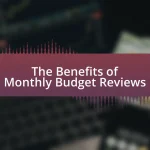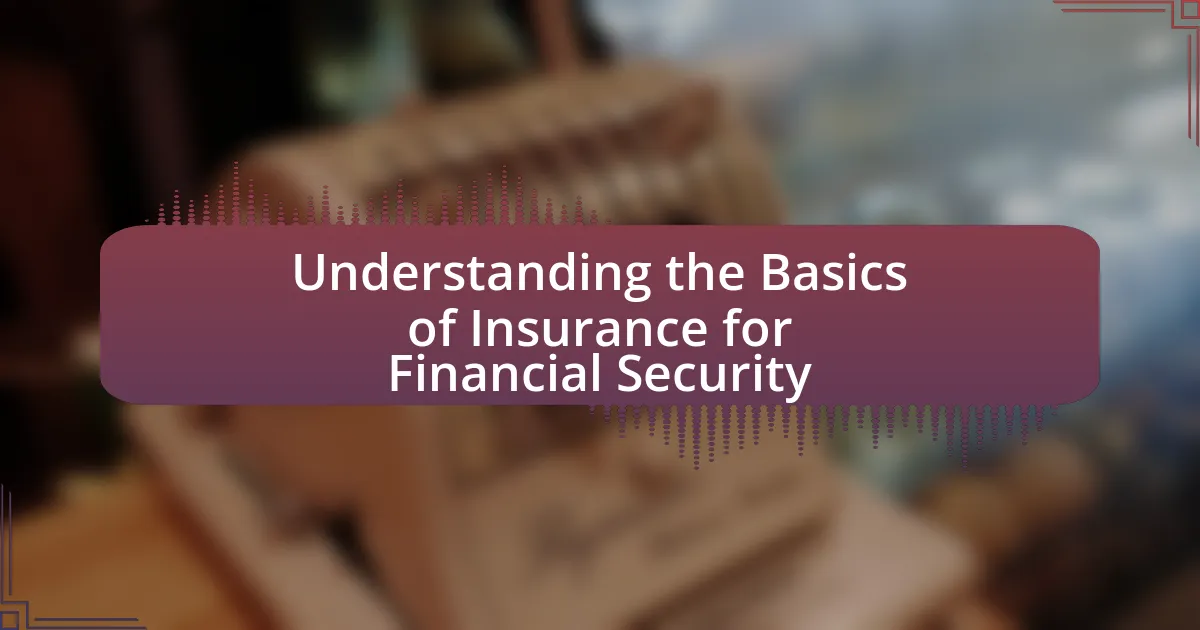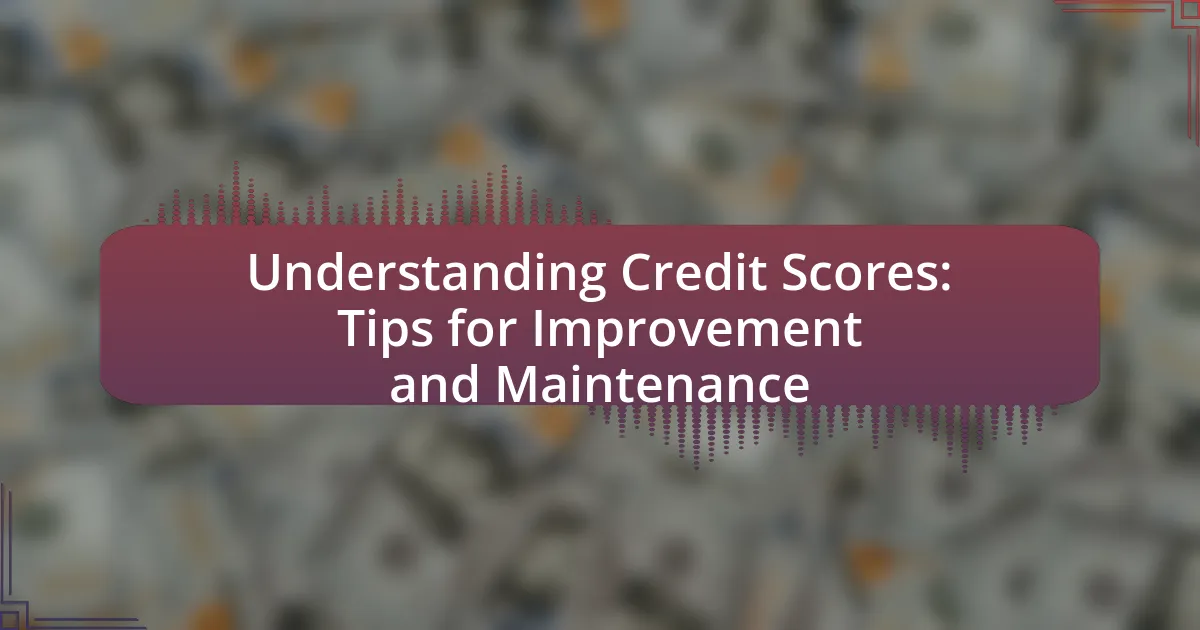Budgeting for beginners is a crucial financial skill that involves creating a structured plan to manage income and expenses effectively. This article outlines the importance of budgeting for financial wellness, emphasizing its role in tracking spending, prioritizing savings, and achieving financial goals. Key principles of effective budgeting, such as setting clear financial objectives and regularly reviewing budgets, are discussed alongside common methods like the 50/30/20 rule and zero-based budgeting. Additionally, the article highlights strategies for maintaining and adjusting budgets over time, common mistakes to avoid, and resources available for improving budgeting skills, ultimately guiding beginners toward enhanced financial stability and wellness.

What is Budgeting for Beginners?
Budgeting for beginners is the process of creating a plan to manage income and expenses effectively. This foundational financial skill helps individuals track their spending, prioritize savings, and achieve financial goals. According to a 2021 survey by the National Endowment for Financial Education, 60% of Americans do not use a budget, highlighting the importance of budgeting as a tool for financial wellness. By establishing a budget, beginners can gain control over their finances, reduce debt, and build savings, ultimately leading to improved financial stability.
Why is budgeting important for financial wellness?
Budgeting is important for financial wellness because it provides a structured plan for managing income and expenses, enabling individuals to achieve their financial goals. By tracking spending and allocating resources effectively, budgeting helps prevent overspending and promotes savings. Research indicates that individuals who budget are more likely to feel in control of their finances, leading to reduced stress and improved financial stability. A study by the National Endowment for Financial Education found that 70% of people who budget report feeling more secure about their financial situation.
What are the key principles of effective budgeting?
The key principles of effective budgeting include setting clear financial goals, tracking income and expenses, prioritizing needs over wants, and regularly reviewing and adjusting the budget. Setting clear financial goals provides direction and motivation, while tracking income and expenses ensures awareness of financial status. Prioritizing needs over wants helps in making informed spending decisions, and regular reviews allow for adjustments based on changing circumstances or financial objectives. These principles are supported by financial management studies, which emphasize the importance of structured budgeting for achieving financial stability and wellness.
How does budgeting contribute to long-term financial goals?
Budgeting directly contributes to long-term financial goals by providing a structured plan for income allocation and expense management. This structured approach enables individuals to prioritize savings and investments, ensuring that funds are directed towards achieving specific financial objectives, such as retirement, home ownership, or education. Research indicates that individuals who maintain a budget are more likely to save consistently; a study by the National Endowment for Financial Education found that 70% of those who budget report feeling more in control of their finances, which correlates with improved financial outcomes over time.
What are the common budgeting methods for beginners?
Common budgeting methods for beginners include the 50/30/20 rule, zero-based budgeting, and the envelope system. The 50/30/20 rule allocates 50% of income to needs, 30% to wants, and 20% to savings or debt repayment, providing a straightforward framework for managing finances. Zero-based budgeting requires every dollar of income to be assigned a specific purpose, ensuring that expenses do not exceed income and promoting conscious spending. The envelope system involves dividing cash into envelopes designated for different spending categories, which helps control spending by limiting access to funds. These methods are widely recommended for their simplicity and effectiveness in helping individuals gain control over their finances.
How does the 50/30/20 rule work in budgeting?
The 50/30/20 rule in budgeting allocates an individual’s after-tax income into three categories: 50% for needs, 30% for wants, and 20% for savings and debt repayment. This method simplifies budgeting by providing clear guidelines on how to distribute income effectively. For example, needs include essential expenses like housing and groceries, while wants cover discretionary spending such as dining out and entertainment. The 20% allocated for savings can be directed towards retirement accounts or emergency funds, promoting financial stability. This rule is widely endorsed by financial experts for its straightforward approach, making it accessible for beginners in budgeting.
What is zero-based budgeting and how can beginners use it?
Zero-based budgeting is a financial strategy where every dollar of income is allocated to specific expenses, savings, or debt repayment, ensuring that income minus expenditures equals zero at the end of the budgeting period. Beginners can use this method by first listing all sources of income, then categorizing and prioritizing all expenses, including fixed and variable costs. They should assign every dollar to these categories, ensuring that all income is accounted for, which promotes financial discipline and clarity. This approach helps individuals identify unnecessary expenses and encourages mindful spending, ultimately leading to better financial management.
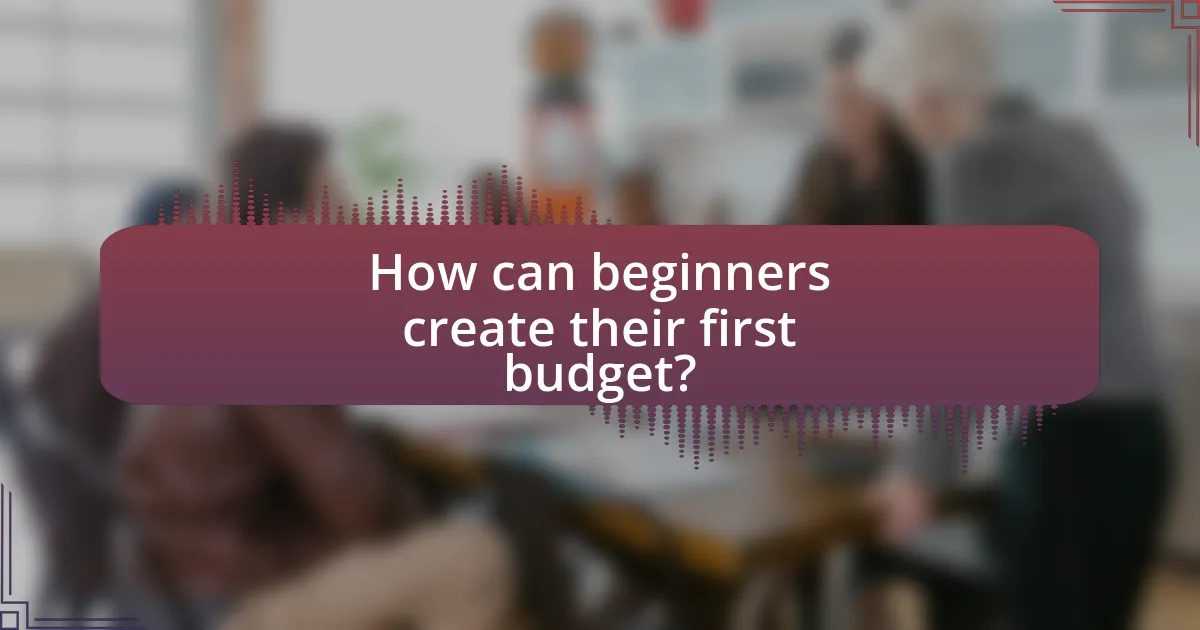
How can beginners create their first budget?
Beginners can create their first budget by following a structured approach that includes tracking income and expenses, categorizing spending, and setting financial goals. First, individuals should list all sources of income, including salaries and any side jobs, to determine total monthly earnings. Next, they should track all expenses for at least a month, categorizing them into fixed costs (like rent and utilities) and variable costs (like groceries and entertainment).
Once income and expenses are documented, beginners can compare total income against total expenses to identify areas for adjustment. Setting specific financial goals, such as saving for an emergency fund or paying off debt, can help guide spending decisions. According to a study by the National Endowment for Financial Education, individuals who budget are more likely to feel in control of their finances and achieve their financial goals.
What steps should beginners follow to set up a budget?
To set up a budget, beginners should follow these steps: first, assess income by calculating total monthly earnings from all sources. Next, track expenses by listing all monthly expenditures, including fixed costs like rent and variable costs like groceries. After that, categorize expenses into needs and wants to identify essential spending versus discretionary spending. Then, set financial goals, which can include saving for emergencies or paying off debt. Finally, create the budget by allocating income to each category, ensuring that total expenses do not exceed total income. This structured approach helps maintain financial control and promotes savings, as evidenced by studies showing that individuals who budget are more likely to achieve their financial goals.
How do you track income and expenses effectively?
To track income and expenses effectively, utilize a budgeting tool or software that allows for real-time tracking and categorization of financial transactions. These tools, such as Mint or YNAB (You Need A Budget), provide features that automatically sync with bank accounts, enabling users to monitor their income and expenses seamlessly. According to a 2021 survey by the National Endowment for Financial Education, individuals who use budgeting tools are 50% more likely to feel in control of their finances compared to those who do not. This demonstrates that effective tracking through technology can significantly enhance financial awareness and management.
What tools and apps can assist in budgeting?
Tools and apps that assist in budgeting include Mint, YNAB (You Need A Budget), and PocketGuard. Mint allows users to track expenses, create budgets, and monitor financial goals by linking bank accounts and credit cards. YNAB focuses on proactive budgeting, teaching users to allocate every dollar and prioritize spending. PocketGuard simplifies budgeting by showing how much disposable income is available after accounting for bills, goals, and necessities. These tools are widely recognized for their effectiveness in helping individuals manage their finances and achieve financial wellness.
What common mistakes should beginners avoid when budgeting?
Beginners should avoid underestimating expenses when budgeting. Many new budgeters fail to account for irregular or variable costs, leading to financial shortfalls. According to a survey by the National Endowment for Financial Education, 60% of individuals do not include occasional expenses like car maintenance or medical bills in their budgets, which can disrupt financial plans. Additionally, beginners often neglect to track their spending accurately, resulting in overspending in certain categories. A study by the Consumer Financial Protection Bureau found that individuals who track their spending are 50% more likely to stick to their budget. Lastly, beginners frequently set unrealistic financial goals, which can lead to frustration and abandonment of budgeting altogether. Research indicates that setting achievable goals increases the likelihood of maintaining a budget by 70%.
How can unrealistic expectations impact budgeting success?
Unrealistic expectations can significantly hinder budgeting success by leading individuals to set unattainable financial goals. When people overestimate their income or underestimate their expenses, they create a budget that is not reflective of their actual financial situation. This misalignment often results in overspending, increased debt, and ultimately, frustration when goals are not met. Research from the National Endowment for Financial Education indicates that individuals who set realistic financial goals are more likely to stick to their budgets and achieve financial stability. Therefore, maintaining realistic expectations is crucial for effective budgeting and long-term financial wellness.
What are the consequences of neglecting to review your budget regularly?
Neglecting to review your budget regularly can lead to overspending and financial instability. When individuals fail to monitor their budget, they may not recognize changes in income or expenses, resulting in a lack of control over their financial situation. This oversight can cause unexpected debt accumulation, as untracked spending can exceed available funds. According to a study by the National Endowment for Financial Education, 60% of Americans do not have a budget, and among those, many report feeling stressed about their finances, indicating a direct correlation between budget neglect and financial anxiety. Regular budget reviews help identify spending patterns and allow for timely adjustments, preventing long-term financial consequences.
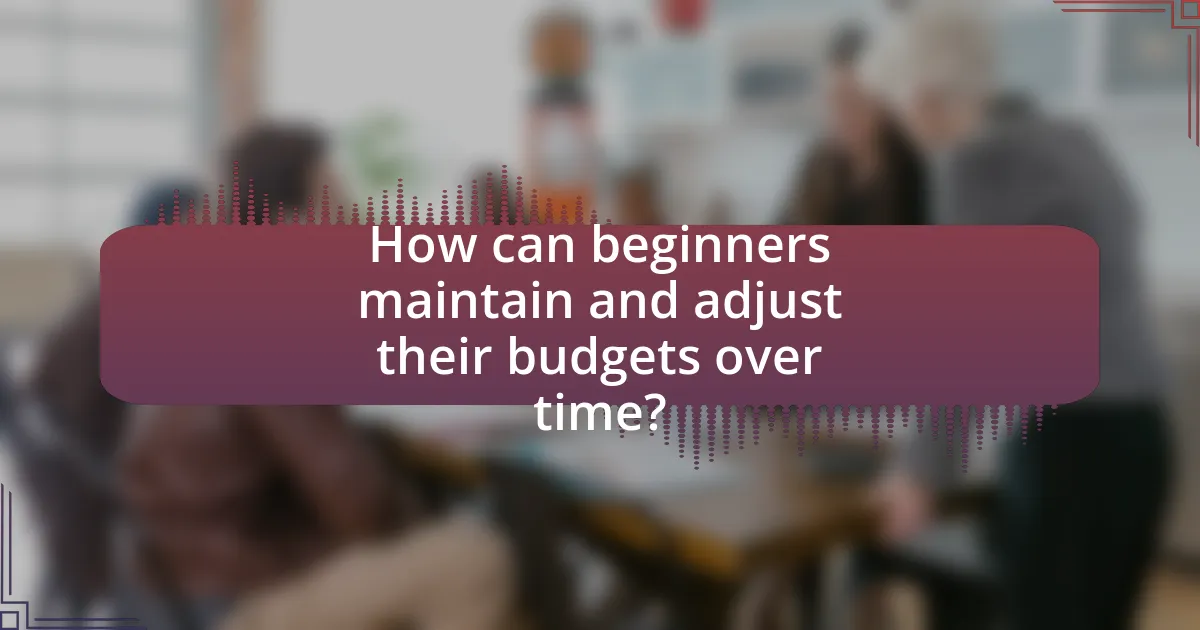
How can beginners maintain and adjust their budgets over time?
Beginners can maintain and adjust their budgets over time by regularly reviewing their income and expenses, tracking spending patterns, and making necessary adjustments based on changes in financial circumstances. Regular reviews, ideally monthly, allow individuals to identify areas where they can cut costs or reallocate funds to savings or debt repayment. According to a study by the National Endowment for Financial Education, individuals who actively track their spending are 50% more likely to stick to their budgets. Additionally, using budgeting tools or apps can help beginners visualize their financial situation and make informed decisions about adjustments.
What strategies can help in sticking to a budget?
To stick to a budget effectively, individuals should implement strategies such as setting clear financial goals, tracking expenses, and using budgeting tools. Setting specific, measurable goals helps to create a focused plan, while tracking expenses allows individuals to see where their money is going, enabling adjustments as needed. Utilizing budgeting tools, such as apps or spreadsheets, can streamline the process and provide visual insights into spending habits. Research indicates that individuals who actively track their spending are more likely to adhere to their budgets, with studies showing that 70% of people who use budgeting tools report better financial management.
How can beginners adapt their budgets to changing financial situations?
Beginners can adapt their budgets to changing financial situations by regularly reviewing and adjusting their income and expenses. This involves tracking all sources of income and categorizing expenses to identify areas where adjustments can be made. For instance, if a beginner experiences a decrease in income, they should prioritize essential expenses and reduce discretionary spending. According to a 2021 survey by the National Endowment for Financial Education, 60% of individuals who regularly adjusted their budgets reported feeling more in control of their finances. This practice not only helps in managing immediate financial challenges but also fosters long-term financial stability.
What role does accountability play in successful budgeting?
Accountability is crucial for successful budgeting as it ensures individuals or organizations take responsibility for their financial decisions and actions. When accountability is established, it promotes transparency and encourages adherence to budgetary goals, leading to more effective financial management. Research indicates that organizations with strong accountability mechanisms are 30% more likely to meet their budget targets, as they foster a culture of ownership and commitment among team members. This commitment drives consistent monitoring and adjustment of budgets, ultimately enhancing financial discipline and achieving desired outcomes.
What are some tips for achieving financial wellness through budgeting?
To achieve financial wellness through budgeting, individuals should create a detailed budget that tracks income and expenses. This involves categorizing spending into fixed and variable expenses, allowing for better control over finances. Research indicates that 60% of Americans do not have a budget, which can lead to overspending and financial stress. By setting specific financial goals, such as saving for emergencies or paying off debt, individuals can prioritize their spending and make informed financial decisions. Additionally, regularly reviewing and adjusting the budget ensures it remains aligned with changing financial circumstances, promoting long-term financial health.
How can setting financial goals enhance budgeting efforts?
Setting financial goals enhances budgeting efforts by providing clear targets that guide spending and saving decisions. When individuals establish specific, measurable, achievable, relevant, and time-bound (SMART) goals, they create a framework that helps prioritize financial resources effectively. Research indicates that individuals who set financial goals are more likely to stick to their budgets, as these goals serve as motivation and accountability. For instance, a study published in the Journal of Economic Psychology found that goal-setting significantly improves financial behavior, leading to better adherence to budgeting plans.
What are the benefits of seeking professional financial advice?
Seeking professional financial advice provides individuals with tailored strategies to manage their finances effectively. Financial advisors possess expertise in areas such as investment management, tax planning, and retirement strategies, which can lead to improved financial outcomes. For instance, a study by Vanguard found that individuals who work with financial advisors can achieve an average of 3% higher annual returns on their investments due to better asset allocation and risk management. Additionally, professional advice can help clients avoid costly mistakes, such as inadequate retirement savings or poor investment choices, ultimately enhancing their financial security and peace of mind.
What resources are available for beginners to improve their budgeting skills?
Beginners can improve their budgeting skills through various resources such as budgeting apps, online courses, and financial literacy books. Budgeting apps like Mint and YNAB (You Need A Budget) provide user-friendly interfaces for tracking expenses and setting financial goals. Online platforms like Coursera and Udemy offer courses specifically focused on personal finance and budgeting, often taught by financial experts. Additionally, books such as “The Total Money Makeover” by Dave Ramsey and “Your Money or Your Life” by Vicki Robin provide foundational knowledge and practical strategies for effective budgeting. These resources are widely recognized for their effectiveness in enhancing financial literacy and budgeting skills among beginners.
How can online courses and workshops aid in budgeting education?
Online courses and workshops can significantly enhance budgeting education by providing structured learning, expert guidance, and interactive tools. These platforms often offer comprehensive curricula that cover essential budgeting concepts, such as income tracking, expense management, and savings strategies. For instance, a study by the National Endowment for Financial Education found that individuals who participated in financial education programs, including online courses, demonstrated improved budgeting skills and financial behaviors. Additionally, workshops often include practical exercises and real-life scenarios, allowing participants to apply their knowledge in a supportive environment, which reinforces learning and retention.
What books or podcasts are recommended for budgeting beginners?
For budgeting beginners, “The Total Money Makeover” by Dave Ramsey and “You Are a Badass at Making Money” by Jen Sincero are highly recommended books. These books provide practical strategies and motivational insights to help individuals manage their finances effectively. Additionally, the podcast “The Dave Ramsey Show” offers valuable advice on budgeting and financial planning, while “The BiggerPockets Money Podcast” discusses real-life budgeting experiences and tips from various guests. These resources are widely recognized for their effectiveness in guiding beginners toward financial wellness.
What are the best practices for successful budgeting?
The best practices for successful budgeting include setting clear financial goals, tracking income and expenses, creating a realistic budget, and regularly reviewing and adjusting the budget as needed. Setting clear financial goals provides direction and motivation, while tracking income and expenses ensures awareness of spending habits. Creating a realistic budget involves allocating funds based on actual income and necessary expenses, which helps prevent overspending. Regularly reviewing and adjusting the budget allows individuals to adapt to changes in financial circumstances, ensuring ongoing financial health. These practices are supported by studies indicating that individuals who actively engage in budgeting are more likely to achieve their financial goals and maintain better financial stability.

